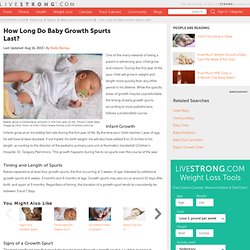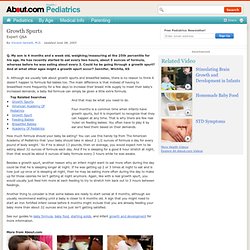

Baby Growth Spurts. It’s inherently unfair, but all too common.

Just when you’re finally getting the hang of a somewhat reasonable breastfeeding schedule, your newborn suddenly changes course and begins eating every hour. And even when he’s done, he still acts like he’s ready to hit the drive-through at McDonald’s, making you wonder if your baby’s getting enough milk. But relax; he’s not starving (even though he’s acting like it). He’s just hit his first baby growth spurt — the first of about five he’ll have during the first year. One of your baby’s most important jobs this year is to grow bigger, and he’ll probably triple his body weight by the time he’s 12 months. Although growth spurts can happen anytime during the first year, your baby will most likely have his initial spurt between one and three weeks; and another between six and eight weeks. The Biology Of Growth Spurts: Grandma Was Right - Infants Do Wake Up Taller.
Grow Baby Grow. Baby's First Year Babies grow astonishingly fast.

By your little one's first birthday, he'll have tripled his birth weight and grown eight to ten inches. Even his head—which is about one third the size of an adult's at birth—will grow faster in his first four months than at any other time. "A child grows more rapidly during his first 12 months than in any other period of his life," says Gregory Plemmons, M.D., medical director of the pediatric primary-care practice at Vanderbilt Children's Hospital, in Nashville.
"What's interesting is that these increases in weight and height aren't slow and steady—they appear to happen in fits and starts. " Researchers are still trying to figure out exactly when and how these periods of growth occur. So how can you tell when your baby is going through a growth spurt? She's hungry all the time. Sharon Kelley knows when her 4-month-old daughter is having a growth spurt. He's fussier than usual. She suddenly hibernates.
How Long Do Baby Growth Spurts Last? One of the many rewards of being a parent is witnessing your child grow and mature.

During the first year of life, your child will grow in weight and length more quickly than any other period in his lifetime. While the specific areas of growth may be unpredictable, the timing of early growth spurts, according to most pediatricians, follows a predictable course. Infants grow at an incredibly fast rate during the first year of life. By the time your child reaches 1 year of age, he will have at least doubled, if not tripled, his birth weight. He will also have added 8 to 10 inches to his length, according to the director of the pediatric primary care unit at Nashville's Vanderbilt Children's Hospital, Dr. Babies experience at least four growth spurts, the first occurring at 3 weeks of age, followed by additional growth spurts at 6 weeks, 3 months and 6 months of age.
The most significant sign that your baby may be going through a growth spurt is a sudden increase in appetite. Growth Spurts. Q.

My son is 4 months and a week old, weighing/measuring at the 25th percentile for his age. He has recently started to eat every two hours, about 5 ounces of formula, whereas before he was eating about every 3. Could he be going through a growth spurt? And at what other ages might a growth spurt occur? Jennifer, Wichita, KS A. And that may be what you need to do.
Four months is a common time when infants have growth spurts, but it is important to recognize that they can happen at any time. How much formula should your baby be eating? Besides a growth spurt, another reason why an infant might want to eat more often during the day could be that he is sleeping longer at night. Another thing to consider is that some babies are ready to start cereal at 4 months, although we usually recommend waiting until a baby is closer to 6 months old. See our guides to baby formula, baby food, starting solids, and infant growth and development for more information.